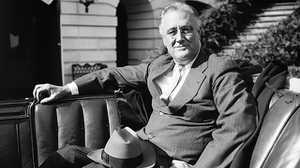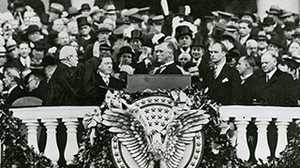Letter from Hugh R. Wilson to FDR
A letter to FDR describing a meeting with Adolf Hitler.
Berlin, March 3, 1938
Dear Mr. President:
I have borne in mind your suggestion that when I met Hitler you would like to have me write you a letter about it. This is now set out to do, although the principal impression I carry away is the lack of drama in this exceedingly dramatic figure.
The protocol of presentation in Berlin is quite rigid. As I approached the President's house in the first car, followed by the staff in other cars, and accompanied by the Chief of Protocol, a detachment of soldiers bearing the regimental bell standard came to present arms, bugles sounded and the band began to play. I took the salute on the steps of the Palace, and we were then ushered into a large waiting room.
As I sat there I remembered the last time I had visited the Palace when Ebert, a saddlemaker, was President, and how Ellis Dresel and I had been ushered directly into his workroom, where we munched black bread and drank beer while discussing matters with Ebert. This nation has certainly gone through kaleidoscopic changes in seventeen years.
Promptly at twelve the doors were thrown open and I was led into the room where Hitler was standing. Behind him, in a solemn row, were von Mackensen, von Ribbentrop and Meissner. Behind them again were several aides, among them Captain Wiedemann, who has recently been in Washington.
I read my speech and Hitler read his, whereupon he led me to a sofa behind a table. He sat on my left, then came von Ribbentrop, then Meissner, then von Mackensen. During the entire conversation the faces of the last three gentlemen never changed in expression, and Hitler and I carried on a conversation carefully listened to by three totally unresponsive and non-participating presences. Their unbroken gravity was such that it occurred to me that the scene might be reproduced if you, Mr. President, should receive a foreign representative in the presence of three Sumner Welles.
As you can imagine from these surroundings, the conversation did not attain any degree of informality, I am not certain as to how the Chancellor receives others, but I should say it had been planned to hold these proceedings on a strictly formal basis.
The Chancellor began by saying that he was very glad to meet me, as he thought it peculiarly happy that a man who already knew Germany had been sent here, a man who already spoke his language and could understand his people. He then paid me some compliments on my knowledge of German, of which he had not yet heard me speak more than a sentence.
I replied, in equally complimentary phrases, that it was a moment of great interest to me to meet a man who had pulled his people from moral and economic despair into the state of pride and evident prosperity which they now enjoyed. Hitler said that it was true that when the National Socialist Party had come in the people were in a state of despair. Everything had broken down through the reparations, debts, trade barriers, and finally the world financial havoc. Unemployment was of staggering proportions. The National Socialist Party had accomplished some things of which he was proud. They had brought their nation to a point where unemployment was unknown, indeed they were suffering now from the contrary factor-a shortage of trained workmen. I remarked here that of the two it was certainly better for a nation to suffer from shortage of labor than from unemployment. Hitler continued and said they had not done everything they had hoped with their people, that there were many and difficult things still to do for them, but that they had within Germany, restored confidence and eliminated the fear of Bolshevism, so the people could work in peace and freedom and without worrying about political matters and the threats to their peace.
Hitler then said that he had watched with interest the methods which you, Mr. President, have been attempting to adopt for the United States in facing some of the problems which were similar to the problems which he had faced when he assumed office. I said that in my short stay in Germany I had already noticed the similarity of some of the economic problems with which you were attempting to grapple, and those which he had attacked, and in some cases solved. I added that you were very much interested in certain phases of the sociological effort, notably for the youth and workmen, which is being made in Germany, and that one of my first tasks would be to report to you on how these were being carried out.
Hitler then rose and said that he was at my disposition for matters affecting the relations between out two countries. He wished me welcome and then accompanied me to the next room where I presented my staff to him.
He was clad, as I was, in a dress suit, and wore only one Order, the Iron Cross. He is more healthy looking man than I had anticipated, more solid, more erect, the complexion is pale, but there is more character in the face than I had anticipated from photographs. He speaks with a strong Austrian accent, but was quite easy to follow. He is a man who does not look at you steadily but gives you an occasional glance as he talks. His hands are fine-artistic. In our conversation, at least he was restrained and made no gestures of any kind. I had met and had a talk with Mussolini, and felt the astonishing charm of that man, as well as a vivid impression of force. I remember, when leaving Mussolini, I wished that I could invite him out to dinner and sit over a beer and talk things over with him. I had no such desire on leaving Hitler. If charm there was it lay in simplicity and directness of utterance, and a certain unwillingness, even after my compliment, to assume for himself the credit for the work which is being done.
These two weeks have been intensely interesting and not the least interesting, in spite of the rather colorless conversation, was this talk with Hitler. The very negative nature of my impression is surprising. I know I shall find this work of deep interest. It may often be unpleasant and difficult. I don't think it will ever be boring. I am deeply indebted to you, as I have told you before, for the opportunity of trying it out.
Very Respectfully
Hugh R. Wilson
Ambassador to Germany






